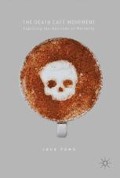Abstract
This chapter “reads” the Wordle canvases that have been generated for each Death Café participant and event. The most important aspect of my research appears in this chapter as I employ Jonathan Feinberg’s Wordle text analysis program and tag cloud generator to present key themes emphasized during dialog, as well as situate these themes within the framework of participants’ utterances. Wordle takes inputted text and subsequently outputs word compilations where a larger word size indicates greater use of that particular word in the text (Viegas et al., Visualization and Computer Graphics, IEEE Transactions, 15(6): 1–8, 2009). Thus, tag clouds display text data about text data: they are outputs of all words presented on a spatial canvas, with larger sized words assumed to be more suggestive than their smaller sized counterparts. From the tag clouds, cautious extrapolations of Wordle outputs will be made so as to make visible key themes and concerns of each participant and of each Death Café. Following our Wordle analyses, I discuss how Habermas’ communicative action manifested during dialog. In the process, I note how narratives shared by attendees are becoming foundational themes for a bona fide death identity, one that generates coping mechanisms for death very much ahead of schedule, one that allows for a degree of the personal in terms of attending to the logistics of the corporeal as well as the metaphysics of the beyond. From the thematic data, the chapter notes how a death identity has been assembled to reinforce a critical appreciation of life and living.
Access this chapter
Tax calculation will be finalised at checkout
Purchases are for personal use only
Notes
- 1.
With the exception of two of the greater Los Angeles area’s Death Café hosts, Betsy Trapasso and Lisa S. Delong, and Karen Wyatt, MD through her online Death Café, all other attendees whose messages were selected for this work have received pseudonyms so as to ensure their confidentiality. Since Betsy and Lisa are iconic activists and public figures in Southern California’s Death Café community, this work does not refer to them pseudonymously. Similarly, Jon Underwood, a much loved public figure, was not assigned a pseudonym. The same orientation was also adopted for Colorado-based Karen Wyatt, MD, a public figure who founded the online EOLU and hosts virtual Death Cafés monthly. Karen has graciously allowed me to transcribe her callers’ discussions from two of her online events (one of which interviewed Jon Underwood).
References
Anastaplo, Goerge. 1986. “Education, Television, and Political Discourse in America.” Center Magazine July—August: 21.
Berelson, B., and P. Lazersfeld. 1948. The Analysis of Communication Content. Chicago: University of Chicago Press.
Butler, Katy. 2013. Knocking on Heaven’s Door: The Path to a Better Way of Death. New York, NY: Scribner.
Garnham, Nicolas. 1994. “The Media and the Public Sphere.” In Habermas and the Public Sphere, edited by Craig Calhoun, 359–376. Cambridge: MIT Press.
Habermas, Jürgen. 1991. The Structural Transformation of the Public Sphere: An Inquiry into a Category of Bourgeois Society. Cambridge: MIT Press.
Habermas, Jürgen. 1994. Justification and Application: Remarks on Discourse Ethics. Cambridge: MIT Press.
Kellner, Douglas. 2000. “Jean Baudrillard.” In The Blackwell Companion to Major Social Theorists, edited by G. Ritzer, 731–753. Malden, MA: Blackwell.
Kemmis, Stephen, and McTaggart Robin. 2007. “Participatory Action Research: Communicative Action and the Public Sphere..” In Strategies of Qualitative Inquiry, edited by Norman K. Denzin and Yvonna S. Lincoln, 271–330. Thousand Oaks: Sage Publications.
Krippendorf, K., and M. A. Bock. 2009. The Content Analysis Reader. Thousand Oaks: Sage.
Manovich, L. 2010. “What is Visualization?” Poetess Archive Journal 2(1): 1–32.
Oldenburg, Ray. 1999. The Great Good Place. New York: Marlowe & Company.
Ritzer, George. 2003. Contemporary Sociological Theory and Its Classical Roots. Boston: McGraw Hill.
Slocum, Joshua, and Lisa Carlson. 2011. Final Rights: Reclaiming the American Way of Death. Hinesburg, VT: Upper Access Inc., Book Publishers.
Viegas, F. B., M. Wattenberg, and J. Feinberg. 2009. “Participatory Visualization with Wordle.” Visualization and Computer Graphics, IEEE Transactions 15(6): 1–8.
Virilio, Paul. 2000. The Information Bomb. London: Verso.
Author information
Authors and Affiliations
Rights and permissions
Copyright information
© 2017 The Author(s)
About this chapter
Cite this chapter
Fong, J. (2017). Death Sentiments and Death Themes. In: The Death Café Movement. Palgrave Macmillan, Cham. https://doi.org/10.1007/978-3-319-54256-0_4
Download citation
DOI: https://doi.org/10.1007/978-3-319-54256-0_4
Published:
Publisher Name: Palgrave Macmillan, Cham
Print ISBN: 978-3-319-54255-3
Online ISBN: 978-3-319-54256-0
eBook Packages: Social SciencesSocial Sciences (R0)

